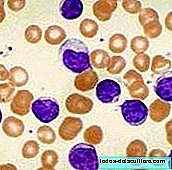
Babies begin to perceive sounds from the womb, but when they begin to do so and how they process the information that comes through them, it is the object of study for scientists.
A study conducted by the Institut Marquès de Barcelona has shown that with a size of just 11 cm, Babies react to the mother's voice after 16 weeks of gestation when the sound reaches them through an intravaginal device.
According to the conclusions presented by Dr. Álex García-Faura, Scientific Director of Institut Marquès at the 25th European Congress of Perinatal Medicine held in Maastricht (Netherlands), Babies practically do not hear outside noises and they only react when the sounds reach them through the vagina, confirming that they hardly hear the voices through the mother's abdomen.
To do this, they have used a device called Babypod, a small device that is inserted into the vagina as if it were a tampon, connected to the mobile and allows the voice of the mother or any other person to reach the fetus.
The funny thing is that they react differently if they listen to music and the mother's voice, since they activate different brain circuits. "Music activates neuronal circuits that trigger emotions," explains the doctor.
When speaking to him, 70% of fetuses only move their mouth when spoken to, but when they listen to music, they perform more complex movements which also includes the protrusion of the tongue.
The study is part of an investigation based on the benefits of music at the beginning of life and relevant data have been found about whether babies are able to recognize the mother's voice in front of other voices.
"Fetuses respond equally to all voices. Now we are presented with a new unknown: to know if the hundreds of babies that have already been stimulated during pregnancy will be able to recognize the voice of their parents if they have heard it during pregnancy since inside the womb and also know if it is a stimulus for the development of language and communication, ”says the specialist.












